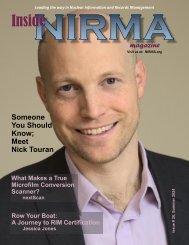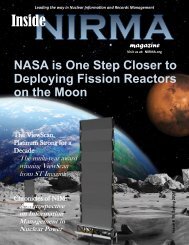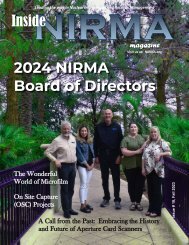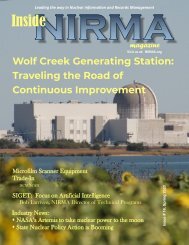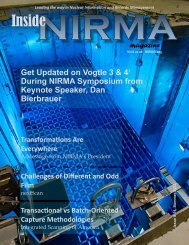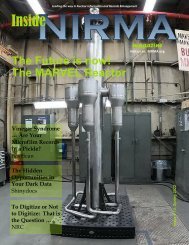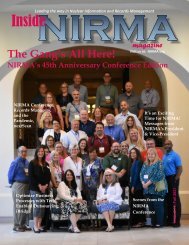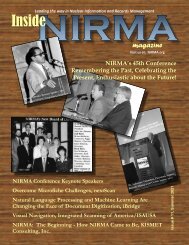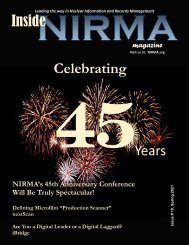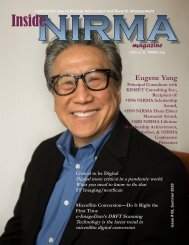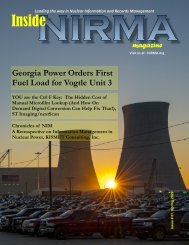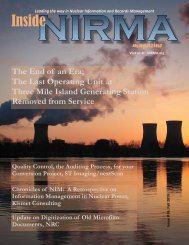Inside NIRMA Fall 2020
Create successful ePaper yourself
Turn your PDF publications into a flip-book with our unique Google optimized e-Paper software.
From the CRM<br />
So You Want to<br />
Become a CRA/CRM?<br />
By Gil Brueckner CRM/NS<br />
I<br />
f you read Bruce Walters’ article “To CRM or Not to<br />
CRM?” in the <strong>Fall</strong> 2019 <strong>NIRMA</strong> newsletter and you’re<br />
thinking about becoming a Certified Records Analyst<br />
(CRA) or Certified Records Manager (CRM), or maybe<br />
you’re already working towards certification, then read on.<br />
This article will describe my journey towards certification and<br />
provide some tips and strategies to make your journey easier.<br />
Cost of Certification<br />
The costs associated with certification are shown below:<br />
I decided to become a CRM after attending the <strong>NIRMA</strong><br />
conference in 2014. I realized I had gaps in my knowledge<br />
and certification provided a means to become more<br />
knowledgeable. I completed CRM certification in 2018.<br />
Requirements for CRA/CRM Certification<br />
The requirements to apply for certification are a<br />
combination of education and experience ranging from a high<br />
school diploma plus five years of experience to a bachelor’s<br />
degree with one year of experience. There is a five-year time<br />
limit to achieve certification, which starts when your<br />
application is accepted. See the ICRM site for more<br />
information on applying for certification.<br />
Ways to Save Money<br />
You can save on books by renting them from<br />
Amazon.com. You can also go to the ICRM – Bookstore to<br />
buy/sell books and other prep resources. You can save<br />
money by not taking an exam prep course, but I don’t<br />
recommend it. The course I took was invaluable!<br />
CRA or CRM?<br />
Which certification should you apply for? It depends on<br />
your interests. The CRA is focused on the core aspects of<br />
RM and is geared towards individual contributors. It requires<br />
passing three exams (Parts 2 – 4). The CRM builds upon the<br />
CRA curriculum by adding leadership and technology topics.<br />
It requires passing six exams (Parts 1 – 6). If you’re not sure<br />
where to start, begin with the CRA. Once you achieve your<br />
CRA (within five years), the clock stops on completing your<br />
full CRM certification. You will be required to maintain your<br />
CRA (100 credit hours every five years), but you can work<br />
toward your CRM whenever you see fit.<br />
Funding Certification<br />
To offset the cost of certification, check with your<br />
employer. Some employers will reimburse certifications. If<br />
yours will, great! If not, perhaps your employer has an<br />
employee award program that can be applied towards<br />
certification. Also, don’t forget to apply for the La ARMA<br />
Nostra Certification Reimbursement Program through the<br />
ARMA International Education Foundation. This annual<br />
program offers six recipients a $500 reimbursement grant to<br />
offset the cost of certification.<br />
Time Commitment<br />
The time spent preparing for the exam will vary with<br />
each person. I spent approximately 250 hours over 2 years to<br />
prepare for the exams for Parts 1 - 6.<br />
8 <strong>Fall</strong> <strong>2020</strong> <strong>NIRMA</strong>.org <strong>Inside</strong> <strong>NIRMA</strong>



